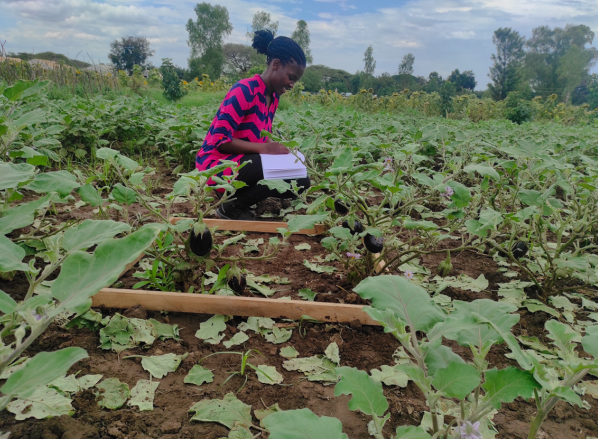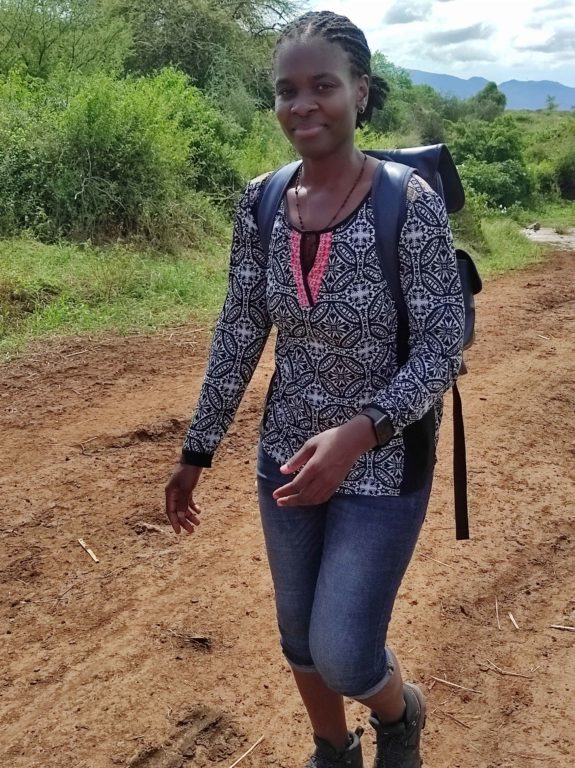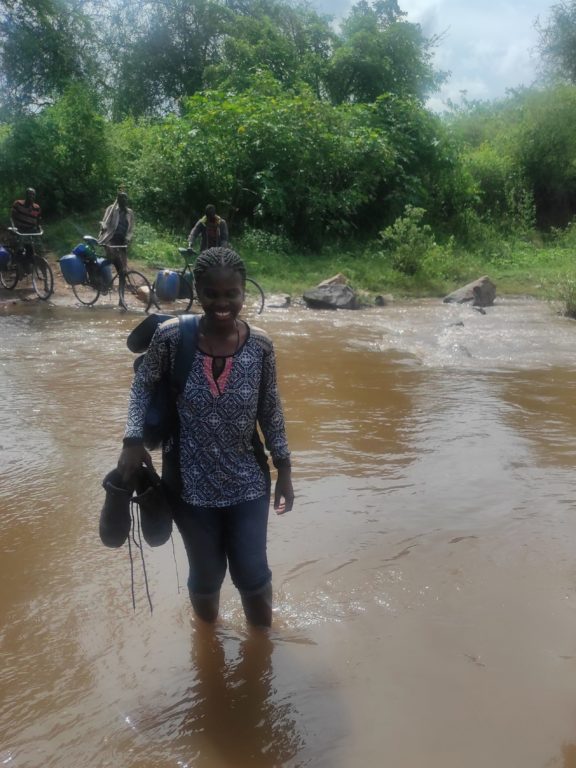This blog post was written by Mary Theodorah Ajal, Master’s student in Sustainable Food Systems at SLU.

Theodorah in one of the kitchen gardens in Uganda. Photo: Justin Kitibwa
Returning to Sweden after 8 weeks of intense data collection/fieldwork in Moroto, Northeastern Uganda, is great. In October 2024, I received a Minor Field Study grant through SLU Global, financed by Sida, that facilitated my research and stay in Uganda. I travelled to Uganda in the first week of October 2024.
My journey to Moroto by bus was filled with wonder, curiosity, and surprises as we drew closer to the Karamoja region. The 7-hour journey from my hometown, Tororo, to Moroto, was a fascinating experience, with the bus making numerous stops to pick up passengers along the trading centers. The most surprising twist was when goats, chickens, sacs of charcoal, and big jerrycans of local brew were added to the bus. We, the passengers, livestock, and other items, got tucked together like peas in a pod, utilizing all spaces including the bus aisle space. It was a journey filled with unexpected discoveries!
I was welcomed and received by the Drylands Transform team of Uganda, Professor Denis Mpairwe, Dr Alice Turinawe, and Mr. Zachary Angella, who offered me valuable guidance during my fieldwork and stay in Uganda.
My research on Characterization and productivity of kitchen gardens and their contributions to food security and livelihoods in Karamoja covered six sub-counties (Nadunget, Northern Division, Loputuk, Katikekile, Rupa, and Lotisan) and 16 villages (Ariamawoi, Kalkalet, kamera, Katamukono, Kidepo, Lakalia, Longoroko, Matheniko, Moroto hospital quarters, Moroto junior quarters, Moroto prisons, Municipal primary, Nabuin, Nadiket, Nakapelimen, and Okilala), within a 40km radius in Moroto district. The study respondent categories included households, development partners/NGOs, government, Drylands Transform team, and Kitchen garden trainers.
It was interesting interacting with the households in the study and learning about their experiences with kitchen gardening and why they started. The commonest motives for household kitchen gardening have been food, income, motivation by government and development partners, leisure, and others because of their great passion for gardening.
It was also interesting to know what different participants considered a kitchen garden and what the development partners/NGOs and the government considered the most successful kitchen gardening approach.
My research also uncovered a diverse range of kitchen gardening approaches. Some development partners/NGOs considered backyard gardening the most successful approach, while others believed the Farmer field school was the most successful. I also came across a fascinating kitchen gardening approach that uses E-learning books about kitchen garden use and construction—an approach where tablets are given to tablet teachers. The community can learn about kitchen gardening with tablets by watching short clips and illustrations on step-by-step guides and the materials used. The community members touch on an area of their choice on the tablet, which then pops up on the screen with audio translated into Karamojong. This diversity of approaches was truly enlightening.
It was interesting to know that respondents in the study perceived and defined a kitchen garden differently; however, the definitions had similar components, such as the purpose of the garden, its proximity to home, its proximity to a water source, the techniques used, and its size.
Although learning about kitchen gardens was interesting and enlightening, I experienced some challenges.
For instance, my translator and I had to travel long distances by foot to locate kitchen gardens since it was a dry season and few households had them. This was physically demanding and time-consuming. I also experienced challenges with access to the field, especially when it rained. The roads were very slippery when it rained, so I postponed fieldwork until the sun shone brightly. Once, we crossed a flowing river to get to the next village, which was a risky and challenging task.

Walking long distances to locate the kitchen gardens. Photo: Justin Kitibwa

Sometimes even crossing flowing rivers. Photo: Justin Kitibwa
Moroto town is close to a military training school. Whenever the soldiers had their training, the gunshots and other sounds made by the military equipment were loud. It always felt like there was a war going on. I am glad that by the time I left, the gunshots never bothered me like before.
During my research in Moroto, I learned the importance of being flexible and having an open mind. These qualities facilitate learning and fact-finding and create room for innovation.
I learned the importance of a sound support system comprised of networks and relationships. This support system played a crucial role in my research process. Whenever I struggled with my research or on one of those low days, I contacted one of my networks or relations for help. Their guidance and support were invaluable in overcoming challenges and staying motivated. I travelled with my children to Uganda; my family took care of my children while I focused on the research.
Parallel with writing this blog post, I am now writing on my master’s thesis.
All in all, I would like to thank my supervisor, Prof. Ingrid Öborn, Assoc. Prof. Sigrun Dahlin, Prof. Agneta Hörnell, Dr Alice Turinawe, Dr Stephen Mureithi, and Prof. Denis Mpairwe, thank you for your continuous support and guidance for my master’s thesis. I want to thank Ms. Kitibwa Justin, who helped me with translations during the research, and Mr. Zachary Angelle, who coordinated all the fieldwork activities and ensured I was safe and comfortable while in Moroto. Lastly, I would like to thank my family, friends, and colleagues for their priceless support. Thanks to SLU Global for the Minor Field Study grant that facilitated my travel and research activities in Uganda.
